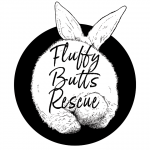In order to become a foster carer, you need to meet the following criteria:
▪ Have experience with animals
▪ Have a spare indoor room away from any of your own pets (if applicable), or the space to have an
outdoor set up (hutch and run)
▪ Have your own rabbits vaccinated against both Myxomatosis and VHD (if applicable)
▪ Be within 30 miles drive of the rescue
▪ Be able to travel to/from the vets for routine and emergency appointments (your own transport is essential –animals cannot be taken on public transport)
If you meet the above criteria and are interested wanting you foster you will need to fill out a fostering application form. Once we receive this application form you will be contacted to discuss in further detail, if you are suitable a member of rescue will arrange to conduct a home visit (however during currently pandemic a home visit may not be conducted but we will discuss this with you). This is to have discussion in greater depth answering any questions you may have and to assess your facilities and experience.
All of our rabbits that will be going into foster care will be vaccinated and neutered, so will be ready for their forever home.
Depending on the current climate the fosterers may need to allow new owners to visit or collect the foster animal. However, this will all depend on current Covid guidance and we can discuss this in more details as needed.
Fosterers will be encouraged to give regular updates and prior notice of any holidays so alternative foster arrangements can be made. All of us at the rescue will be on hand to offer any advice and support as needed.
Allocation Animals to Foster Homes
Once you have applied and been approved to be a fosterer. We will then allocate animals to foster care homes based on decisions made between the rescue directors and fosterers. We will take into consideration the
animal’s needs and fosters experience, to see where the animal(s) will be best suited. When an animal needs to be placed in foster care the fosterer will be contacted to find out if they are able to take on the animal at that time and to finalise all details.
Equipment & Supplies
The Rescue can provide basic equipment, including a carrier, indoor cage or outdoor hutch and run, litter tray, hay, bowls and food. Fosterers should not mix equipment between their existing animals and their foster animals this is for health and hygiene reasons.
The equipment belongs to the rescue and once the fostered animal is no longer in your care or if you are no longer fostering then the equipment should be returned to the rescue. The rescue will provide pellets, hay and
some other treats but foster carers will need to provide daily vegetables. Advice can be given on what to feed the animals and every foster animal will come with information about their diet, behaviour and other information.
Fostering Information & Policy
Other Animals & Children
Animals placed in foster homes will not be permitted to mix with any of the foster carer’s own pets. Fosterers
therefore need to have a separate space where the foster animal(s) can be adequately housed and isolated. If you are fostering rabbits any other rabbits in the home must be fully vaccinated; proof of vaccination will be asked for at the assessment visit. If fosters have children in the house (including visitors), it is important that their children are supervised with the animals at all times. This is for the safety of the animal and also the child.
Medication and Veterinary Treatment
If an animal is on medication whilst in foster it is the fosterers responsibility to administer this. We will discuss this
with you and never ask fosters to take on animals that they do not feel confident in supporting. Hopefully this will not happen but in the situation a foster carer has any concerns about their foster animal the
first step is to contact the rescue staff. They will advise you on the situation and what to do next. Animals may only be taken to our current vets (we will give you the details to your closest one, as we have two), or their
appointed out of hours service, for treatment. We will advise on whether and when treatment is necessary and contact the vet. The foster carer will be responsible for transporting the animal to the vets. If you are unable to
contact the rescue staff or manager you may make contact directly with the vets.
What if somethings go wrong?
We will be there to support you but if you experience difficulties with the animal in your care, please contact the
rescue for advice. If there is a reason why the fostered animal cannot remain in the foster home, alternative
arrangements will be made as quickly as possible.
Thank you for considering fostering.
Please do not hesitate to get in touch if you wish to ask any questions.
We really hope that fostering will be a rewarding experience for anyone that does become foster with us.
Please complete and email the form below to hello@fluffybutts.org.uk
